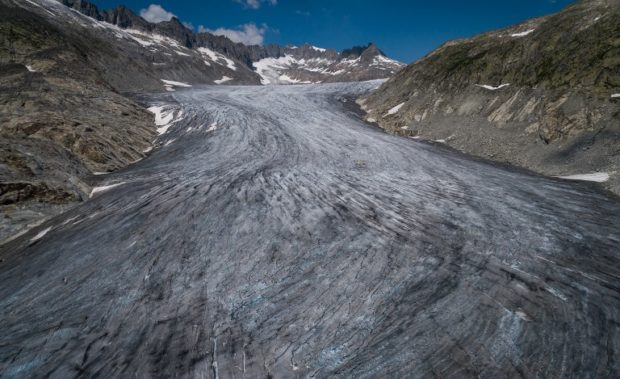Heat wave melts asphalt in Europe

A female orangutan covers her head with a sheet on a warm summer day at Madrid´s zoo on August 4, 2018. Europe sweltered in intense heat with temperatures hitting near-record highs of 46 degrees Celsius (115 degrees Fahrenheit) in Portugal, while elsewhere the high temperatures, exacerbated fires and melted the asphalt on highways. AFP
MADRID, Spain – Europe sweltered Saturday in intense heat with temperatures hitting near-record highs of 46 degrees Celsius (115 degrees Fahrenheit) in Portugal, while elsewhere the high temperatures, exacerbated fires and melted the asphalt on highways.
Here is a roundup:
Spain: three dead
In southern Spain, the heat continued to pound the tourist city of Cordoba reaching 44 C.
In Catalonia in the northeast, a fire on the border with France forced the closure of a highway between both countries for several hours.
By early evening, it was open to traffic again as firefighters said the blaze had been brought under control.
That wasn’t the case for a wildfire in San Vicente de Alcantara in the southwest on the border with Portugal, where strong winds and high temperatures were fanning the flames, the regional environment and rural affairs department said.
At least 11 water-dropping planes and other aircraft were helping firefighters on the ground.
The soaring mercury has already claimed the lives of three people who died of heatstroke.

Beachgoers lie in the sun at a beach in Berlin’s Wannsee area as the heatwave in Europe continues with temperatures reaching 33 degrees Celsius in Berlin on August 4, 2018. AFP
Portugal: peak heat, fire
The heatwave was expected to reach its peak on Saturday, said Paula Leitao of the Portuguese Institute for Sea and Atmosphere (IPMA).
In Monchique in the south, a forest fire raged on two fronts, aided by “a temperature of 46 degrees but a real feel of 50 degrees” and very little humidity in the air, Victor Vaz Pinto, head of rescue operations in the district, told local media.
Over 700 firefighters helped by 10 water-dropping planes and helicopters were working to put it out, according to Vaz Pinto and the civil protection agency.
In Lisbon, authorities have closed playgrounds and called on people to avoid picnics and other outdoor activities.
Refuges for homeless people have also opened earlier during the day to allow them to take shelter from the crushing heat.

This aerial view shows the Rhone Glacier melting near Gletsch on August 3, 2018, as a heatwave sweeps across northern Europe. AFP
Austria: dogs fitted with shoes
In Vienna, police dogs due to patrol a beach volleyball tournament were fitted with special shoes.
Police said that even if temperatures were not excruciatingly hot, reaching just 34 C on Saturday, the dogs would have to spend hours walking on surfaces exposed to the sun that could easily go over 50 C, and would still need the shoes.
Netherlands: asphalt melting
In the Netherlands, authorities closed certain sections of highways where the heat had melted the asphalt.
The central city of Zwolle, meanwhile, started cutting the branches of some 100 poplar trees.
Dutch public television NOS explained that branches could break due to the heat and create danger for drivers or passers-by.

A picture shows a parched section of the Wayoh Reservoir spanned by the Armsgrove Viaduct at Edgworth near Bolton, northwest England, on August 1, 2018, as dry and hot conditions were set to continue in much of Britain during a heatwave in Europe. Britain has experienced its driest first half to a summer on record, with temperatures topping 30 degrees Celsius for several days, according to the Met Office. Wayoh reservoir supplies drinking water to the northwest Town of Bolton in Greater Manchester. AFP
France: nuclear reactors close
A total of four nuclear reactors in France have been closed due to the heatwave.
French power company EDF said the measures were taken to avoid temperature hikes in rivers. The nuclear plants draw water from rivers to cool down the reactors and then return it to the river.
Saturday was also the summer’s busiest day on the roads, as July holiday-makers returned home and those who vacation in August departed.
By late morning, some 705 kilometers (440 miles) of traffic jams had been reported, according to France’s traffic authorities, as the sun beat down and temperatures soared to 41.3 Celsius at Beziers in the deep south. A record 67 departments were on orange heatwave alert for Sunday — a number also reached on June 21 — with only the northwest set to be spared another baking day.
Italy: health warnings
Italy too faced the summer’s busiest day on the roads for the same reason as France and media reported one woman aged 79 had died from apparent heatstroke on a beach in the northwestern Liguria region.
Holiday-makers were expected to face adverse weather conditions wherever they went with no let-up in the scorching heat in the north and violent hailstorms forecast in parts of the south.
This week, the Legambiente association for the defense of the environment published a report on the negative effects of heatwaves.
It revealed that in Lazio, the region where Rome is located, heatwaves had caused around 7,700 deaths since 2000.

Children play in a water fountain in Nice, as a heatwave is sweeping across northern Europe on July 31, 2018. AFP
Sweden: Relief
Following its hottest July in 250 years, rain showers gave Sweden some respite on Saturday across most of the country.
The mercury fell to more typical summer temperatures of around 20-25 C, the Swedish Meteorological and Hydrological Institute said. /cbb